|
Hear! The sound of seven different thunders - The Summer Conference of 2013
|
|
|
글쓴이 :
관리자
|
|
"All of us gathered here. We are the children loved by the Lord..." The Summer Conference of 2013. The Unified Youth Praise Team from Orlando and LA of the U.S sang the gospel song of “We Will Keep Our Faith Alive” in Yeoju Pyungkang Conference Center. This song has been sung many times previously but on the day it was extra special. Singing one verse in Korean, one in English, one in In-donesian, and lastly in Chinese, we could not sing along all the verses in all those languages, but the believers from all over the world had their hands high and praised thankfulness with their eyes closed. This was the repre-sentative scene of 2013's Summer Conference to where the people all over the world came to hear the new Word of God with high anticipation. Let us think about the Word of God during the 4 nights and 5 days and journey back the panorama of God's grace.

The theme of this year's Summer Conference is "Let us become the people of God that will fulfill God’s eter-nally unchanging covenant"(2 Sam 23:5, Psalm 105:8-10, Acts 13:22). What is covenant? It is the tool made with mankind to continue God's redemptive (saving by paying price) history. In order for the people of the Lord to carry out the covenant, they first must know exactly what is contained within the covenant. Moreover, they must live according to the covenant. For us to live according to the covenant, what God gave us is the Ten Commandments. The people who obey the Ten Commandments are ordered in all things and secured by God (2 Sam 23:5). There will be contentment and true satisfaction in all things.
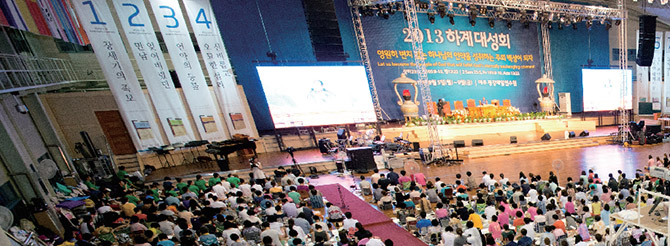

Even our youth and the things we like are all getting old whether we know it or not. When we are not awak-ened by the Word of God, we cannot help but live in deception by chasing after the world of vanity. However, one who abides in Jesus Christ always lives in hope with livelihood every season of the year. Such person is not afraid of the world. Do not let go of this year's opportunity. If you lose 2013, you will lose your lifetime. Please do not follow the steps of the Israelites over whom God watched in worry for 40 years in wil-derness. Pray for husband and wife, parents, and children. Everything will happen exactly as you pray. We have lost many things to this day, but now we can reclaim them with God's miraculous blessings. To believ-ers, nothing is impossible. The lack of faith causes sickness. We must believe the Word of God. Because of their lack of faith, it took the Israelites 40 years to enter Canaan which should only take 22 days. The best strategy and weapon for God and his believers are only to believe in God. When we live by believing the Word of God, we can conquer the land of Canaan which God prepared and preserved from the time of cre-ation of the universe and promised to the Israelites. We are still living in Egypt. Egypt is a place of disbelief. Coming out of Egypt is the moment of eternal life, heaven, and redemption. Bet your life to the Word of God. We are unrelated people; yet, in the Lord, we are brothers and sisters. Fight against sin and win and persevere with love and kindness. Endurance is the way to receive God's grace.


During the WWII, the day when the UN troop seized the winning flag at Normandy Landing was called the D-Day. However, it took more than one year until the day of the final victory, V-Day. Jesus's death on the cross and resurrection is our D-Day. Nevertheless, for the Son of Man to receive the final glory on the V-Day, there should be “one person” who can become His foothold of faith. With that “one person” the Word of God can move forward. The first book of the History of Redemption series was published on October 27, 2007 and it was the D-Day for the movement of the Redemption History. Now it has been 7 years since that time and we have the seventh book of the History of Redemption series. We must become that “one person” to carry the flag of victory in frontline and hoist it, ushering in the V-day by enthroning the Lamb from the right hand of the throne (Rev 7:10).

The most shocking scene in the Bible is that all of the 603,550 grown Israelite men came out of Egypt died in the Wilderness except for two men, Joshua and Caleb. This is a warning to us. In order not to die, what should we do? The Bible tells us that we will not all sleep, but we will all be changed (1 Cor 15:51). Enoch did not see death and “was taken up” alive (Heb 11:5). To be taken up, there should be “no change of heart.” The Word of God should not be added or deleted intentionally. We must be one with God (dabaq in Hebrews). This word means “holding fast and not leaving” (Deut 4:4, 10:20, Gen 2:24, 34:3), and “staying close.” Like the ones who died in the Wilderness, we should not undermine and disregard God's power. Like Joshua and Caleb, we must follow God wholeheartedly (malehu in Hebrews). Like Enoch, we must walk (halak in Hebrews) with God (Amos 3:3). Like David, we must be people after God’s heart.
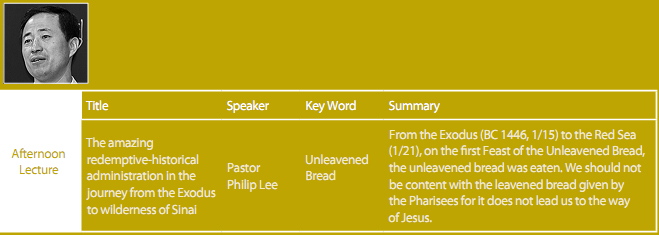
On the fourth day of the creation, the four seasons, days, and years were created, and then the calendar along with the days of feast was set (Gen 1:14). God's redemptive history is at work in accordance with the days of the feasts. Therefore, understanding the feast days enables us to know the past and the future. Through the exodus, God reminded His calendar and the day of Sabbath to the Israelites who had long forgotten them (Exod 12:2). The life of a believer is a battle between living according to God's calendar and Egyptian calendar, which means living according to one's own will and desire. In the Bible, Jesus spoke of His “departure” with Moses and Elijah (Luke 9:31). The word “departure” is exodus in Greek and it means leaving Egypt. John said that the place where Jesus hung on the cross is Egypt (Rev 11:8). Just like the lamb given as a sacrifice for the Passover right before the exo-dus, Jesus was crucified on the cross as the Lamb of the Passover on behalf of our old selves. We too must come out of Egypt and be baptized by crossing the Red Sea (1 Cor 10:1-2) so we can live according to God's calendar and present ourselves as instruments of righteousness to God (Rom 6:13).

The characteristic of the Ezekiel’s temple symbolizing the fulfillment of redemptive covenant is that it has a “per-fect square” shape for its main forms including the court, outer wall, inner wall, and altar. “Perfect square” means balance, stability, and harmony. The believer is an upright person. In other words, he must be holy, devoid of flaw, without falsification, and not leaning one side. The walls of the Ezekiel’s temple that is used to distinguish holy from unholy is one rod (31.2m) long in height and in width, once again being in “perfect square.” The height rep-resents the love toward God and the width represents the love toward our neighbor. The two essential principles of the Ten Commandments are the love toward God and love toward neighbor (Matt 22:37-40). From under the threshold of the Ezekiel’s temple where the believers who love their God and neighbors are gathered, the living water flows and covers the world (Ezek 47:8). Wherever the living water of the redemptive history flows, bursts of shouts are heard: "This is the Word of God that will revive our nation!"

Having come out of Egypt (BC 1446, 1/15) and after crossing the Red Sea (1/21), they walked for days and arrived at Marah (1/24). In Marah, God established a statute and an ordinance (Exod 15:25). A “statute” (Hoq in Hebrews) is used usually for commandments toward God whereas an “ordinance” (Mishpat in Hebrews) is toward men. When Moses was proclaiming the Ten Commandments, he noticeably added "as God commanded you" for the two commandments: “keep the day of Sabbath” among the commandments regarding God and “honor your father and mother” among the commandments regarding men (Deut 5:12, 16). This extra phrase indicates that the two commandments had been already proclaimed in Marah. God made Israelites stay in Marah for one week and tested them on keeping Sabbath (Exod 15:25) and afterward instructed them to move on to Elim (BC 1446, 2/2). In one month after the exodus, they arrived at the Plain of Sin (2/15) and then God began sending them manna. On the sixth day (2/21) God sent manna twice the amount, and on the seventh day (2/22) God did not send any. This was the way of God teaching the Israelites of the lost days of week and Sabbaths ever since the fall of mankind.

The year BC 840 marks the beginning of a dark age which lasted 73 years. It was a period that was deleted entirely from Jesus's genealogy. When Athaliah the daughter of the wicked King Ahab killed the 42 descen-dants, the children of eternal covenant, from the family of King David, the redemptive history faced the crisis of coming to an end. However, the high priest Jehoiada and his wife Jehoshabeath put their lives on stake by hiding the baby Joash. This was a brave act that helped the redemptive history of the eternal covenant to con-tinue. Nevertheless, Joash who had carried on the redemptive history was deleted from Jesus's genealogy in the end. The flattery of the idol-worshipping princes sadly caused Joash to become proud; Joash ended up betraying the grace of Jehoiada and even murdered his son Zechariah. Pride goes before destruction. God shows the importance of holy matrimony using the case of Athaliah that almost discontinued the flow of the redemptive history through the household of David. This case made God’s proclamation even clearer: God's redemptive history moves on despite all hindrances.

The temple is “the covenant that can be seen with eyes.” The essence of temple is covenant and each part of the temple symbolizes covenant. The chosen people Israelites practiced idolatry and ended up breaching the Sinaitic covenant. As a result, Solomon’s temple was destroyed. The last fight for believers would also be the fight against idolatry. Anything that is more precious and greater that God is idol. This is why the Ten Commandments are important. The ones who do not obey the Ten Commandments are idol worshippers. During the period of their captivity in Babylon following the destruction of their temple, Ezekiel was the sec-ond Moses. He took the burden of the people's transgression and resolved the problem by restoring the breached covenant. It was through Ezekiel that the nation was restored and people returned from captivity. God showed the vision of Ezekiel’s temple to Ezekiel. The Ezekiel’s temple is the entryway into the invisible temple (New Jerusalem) from the visible temple (earthly temple); it is like a blue print that shows how to get there, and therefore, is the sum and the conclusion of the New and Old Testaments. Hence, when the Ezekiel’s temple is revealed, the end time is here.

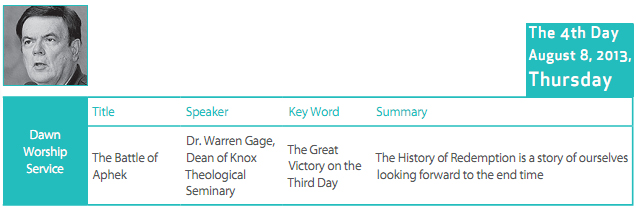
The battle at Aphek symbolizes what took place on the cross. Israel’s Ark of Covenant was taken away by the Philistines. What is the Ark of Covenant? The three items inside the Ark are the symbols that represent the transition from death to life, signifying the resurrection of Jesus. At the time of entrance to Canaan, the Ark of Covenant crossed Jordan River led by Joshua; Jesus, the true Ark ('Jesus' is 'Joshua' in Hebrew) was bap-tized in the same river, Jordan, and began his public ministry. The Ark was taken to the hands of the uncir-cumcised because of the high priest Eli's sin; this was a prophecy of Jesus being handed over to the uncircum-cised Romans because of hatred and jealousy of the high priests. The Ark was taken to Philistines and to the house of Dagon their god. On the first day, it seemed as Dagon claimed victory. But on the second day the statue of their god Dagon fell on the Ark, and on the third day its head and two hand wrists were cut off and became impossible to restore. This foreshadowed the Jesus’s victory over all idols and His resurrection on the third day. The scene of the high priest Eli’s death?by breaking his neck just like Dagon and losing his two sons (Dagon's broken two hand wrists)?shows, in truth, the judgment upon Israel's idolatry, not that of the Philistines.

Psalm 22 written by David are the lines spoken by Jesus on the cross. Even in the time of utmost pain Jesus recited this poem of lamentation (verses 1-11), petition (verses 12-21), and praise (verses 22-31). In lines 1 to 11, it appears as though He is lamenting about how God forsook Him. But in truth, He is experiencing our pain as ourselves, and at the end, is confirmed that God will answer His prayers. In lines 12-21 contain the 7 lines of lamentation and 3 lines of petition, making up the number of perfection with number 7 and 3 as well as the mysterious composition of 10. Furthermore, this psalm is transformed into praises in lines 22 to 31. It is a very dramatic reversal, almost like the resurrection of Jesus, expressing the assurance of salvation. As such, this well-balanced structure of psalm 22 shows that even in the midst of extreme pain, Jesus did not lose con-trol of Himself and rather was in control of all situation. In particular, line 27 states, “all the prosperous of the earth” and “all those who go down to the dust, even he who cannot keep his soul alive” will worship before the Lord; this means that God will reach out to answer the prayers of those outside of the covenantal community.
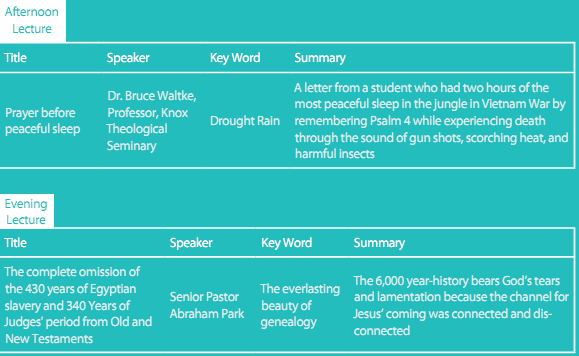
Jesus's genealogy in Matthew Chapter 1 states "Ram was the father of Amminadab"(Matt 1:4). But Ram was a son of Hezron, one of Jacob's 70 family members and lived during the beginning period of Egypt. Since Amminadab is the father of Nahshon who was the leader of Judah tribe at the time of exodus, he lived during the end period of Egyptian slavery (1 Chr 2:9, Gen 46:12, Num 26:21, 1:7, 2:3, 10:14). The entire 430 years of Egyptian life was omitted from the genealogy. Also, it states, "Salmon was the father of Boaz" (1:5). However, Salmon who married Rahab lived during the beginning period of settlement in Canaan, while Boaz in the Book of Ruth lived during the end period of Judges. So 340 years period of Judges are also omitted. Why are these periods excluded from genealogy? It was because they forgot about God and practiced idolatry during these periods. They did not remember all the love and miracles from God. They even forgot about Sabbaths and did not keep them. As the result, they became slaves and were subjected to cruel treatments and suffering likened to iron furnace. Worshiping idols will only lead us to fire. Live a life of worship as foremost priority. Pray for the help from the Holy Spirit so that we are protected from the temptations of this world.

The Book of John begins with, "the Word became flesh, and dwelt among us" (John 1:14). In original Greek, this verse can be rendered: "the Word became flesh and built tabernacle in us." The last book the Book of Revelations is also written by John, and it states: "the tabernacle of God is among men, and He will dwell among them.” For Apostle John, both the beginning and the end was tabernacle. This tabernacle is Jesus Christ. The tent in the Wilderness, or the tabernacle, cased the stone tablets engraved with God's Word, and it was surrounded by the 12 tribes of Israel. Jesus had the Word within His flesh and his disciples surrounded Him. From the very entrance of tabernacle are following objects in order: 1) lamb for sacrifice, 2) altar of burnt offering, 3) laver, 4) table of the bread of the Presence and 12 bread, 5) lamp stand, 6) altar of incense, and 7) Ark, all of which represent Jesus. Amazingly, John explains them in their exact order in Book of John: 1) John the Baptist shouts out "behold, the Lamb of God who takes away the sin of the world!" (John 1:29), 2) Jesus said "the Son of Man be lifted up" just as the offering is lifted up at the altar of the burnt offering (John 3:14), 3) Jesus said to a Samaritan woman, "but whoever drinks of the water that I will give him shall never thirst; but the water that I will give him will become in him a well of water springing up to eternal life." (John 4:14), 4) Jesus fed the 5,000 with five bread and two fish: "so they gathered them up, and filled twelve baskets with fragments from the five barley loaves which were left over by those who had eaten" (John 6:13), 5) Jesus said "I am the light of the world" and made the blinds open their eyes, but Pharisees argues for seven times (9,10,15,17,21,26,30,32), 6) Jesus offered up a “prayer of high priest” for Himself, His disciples, and all believers before His crucifixion (chapter 17). “Incense” symbolizes prayers. 7) Mary Magdalene peered into the tomb where Jesus lied, and then one of the two angels sat on the side of head and the other on the side of feet. A striking resemblance is seen in the mercy seat covering the Ark, where two cherubim sat opposite from each other.
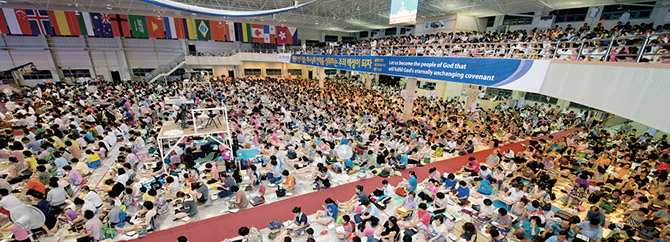

After the closing worship service, Senior Pastor Abraham Park called on to the stage the pastors, evangelists, Dr. Bruce Waltke “the world’s greatest living theologian,” and Dr. Warren Gage the Dean of Knox Theological Seminary. Then, as everyone sang together Hymn 524. "God will be with us until we meet next time..." the eyes of the congregations welled up with tears of thankfulness and overwhelming joy. The presence of these two renowned scholars proved the quality and reputation of the Summer Conference at Pyungkang Cheil Church as the “world's best biblical conference.” This stage scene was the fulfillment of the vision from three years ago: "Today it seems as if we are watching on screen Senior Pastor Abraham Park stand holding the torch of truth and life of Christianity under spotlight in front of conference with many scholars of this century (from the congratulatory speech by Min, Kyung Bae, Honorary Professor, School of Theology, Yonsei University during Thanksgiving Worship Service on publication of the fifth book of the Redemption Series Book on August 4, 2010). During the five days, six-teen lectures moving back and forth from Old Testament to New Testament and dealing with various topics such as exodus, the Ten Commandments, Ezekiel’s temple, Psalm, the period of Judges, and the period of Kings. Nevertheless, at the end, mys-teriously all of these were tied into one great theme. Now, we automatically nod our heads at the words “unprecedented grace of God.” Undoubtedly, God’s grace experienced last year was great and His grace the next will be great, also; but this year's was definitely packed with grace that was never seen before and will never be again. Senior Pastor Abraham Park pro-claimed the conclusion of the 2013 Summer Conference with these two verses: According to my earnest expectation and hope, that I will not be put to shame in anything, but [that] with all boldness, Christ will even now, as always, be exalted in my body, whether by life or by death. For to me, to live is Christ and to die is gain. (Philippians 1:20-21) by Reporter Ho, Joon-seok
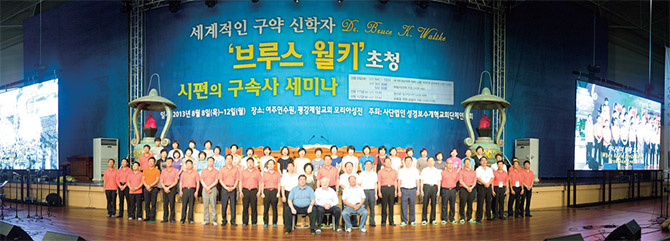 |
|

